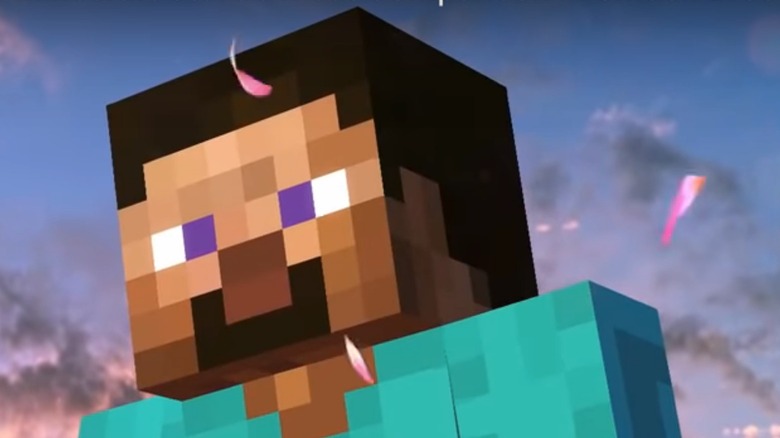Minecraft Creator Reveals The Truth About This Popular Steve Fan Theory
Any fans of Minecraft who thought that the main character Steve looked oddly familiar were not alone. It seems a rumor, started by Twitter user Yuusha, suggested that the main default Minecraft character was actually based on Grand Theft Auto: Vice City's protagonist, Tommy Vercetti — or at least inspired by him. While the original tweet that started the wildfire theory has since been deleted, it gained some serious traction. Yuusha even backed up his claim by linking to a blog post written by Minecraft creator Markus Persson, better known as Notch.
The post on Tumblr — written way back in 2009 — consists of Notch seemingly describing his progress working on a game (presumably Minecraft) while mentioning a "scrapped" Grand Theft Auto "type" project. Notch said he used the designs he had created from the nixed GTA project as a foundation for his work since it seemed to fit the design he was going for. This was considered undeniable proof by Yuusha and for other fans of the theory. Yuusha continued his thoughts in a thread and pointed out: "Steve and Tommy look identical and given that Notch is supposedly a big GTA fan [ . . . ] then it might not just be coincidence."
Saying that the two characters appear "identical" may be a little bit of a stretch, but the similarities are certainly there. Both Tommy and Steve have brown hair, similar skin tone, and are wearing shirts that are the same bright teal color. But besides their physical appearance, they have little to nothing in common. Tommy was a mafia gangster with violent tendencies, who decided to try out the illegal drug trade during his adventures in Grand Theft Auto: Vice City, released by Rockstar Games in 2002. Steve, on the other hand, has no backstory, and even calling him "Steve" is a stretch — Notch stated that he came up with the name as a joke.
But it seems that the popular fan theory was put to rest when Notch replied to Yuusha's Twitter thread, flatly denying any intended connection between Steve and Tommy. "I just picked some colors," Notch said. "There might be some subconscious thing going on since I was super into GTA Vice City but I can't confirm that. Heck, I'm not even sure the timelines match up." Yuusha took advantage of the opportunity to ask Notch another burning question: whether or not Steve was intended to be of ethnic origin. Notch simply replied: "I didn't think about it."
Notch's answer to this question matches with a previous statement he made about the Minecraft player's ambiguity, particularly pertaining to gender. In the same Tumblr blog where he mentioned where the name Steve came from, Notch talked about his intentions for the characters in game; which is that all of them — including mobs and animals — are genderless.
"The human model is intended to represent a Human Being," Notch wrote. "Not a male Human Being or a female Human Being, but simply a human being. As for the animals: "[ . . . ] the [chickens] have heads that look like roosters, but still lay eggs. For breeding, any animal can breed with any other animal of the same species." Notch did point out at the beginning of the post (written in 2012) that, at that time, he was not the lead developer and these were simply the ideas he'd had while working on Minecraft.
Notch's presence on Twitter has not come without its share of controversy. He apparently deactivated his account in August, after demanding that YouTuber Mark Brown of Game Maker's Toolkit "drop the politics." It seemed that the feud began following a Twitter post by Brown (which has since been deleted) in which he stated his dislike for certain Presidential campaign ads that were popping up on his YouTube videos. Brown was happy to oblige to Notch's request, on the condition that Notch delete his account. Notch was to his word — sort of. He did deactivate his profile, though he returned to Twitter on Oct. 3.
Notch was once known for his bizarre and sometimes offensive tweeting habits. For instance, Notch once made statements that outraged the transgender community, suggesting that trans people should be considered "mentally ill."

